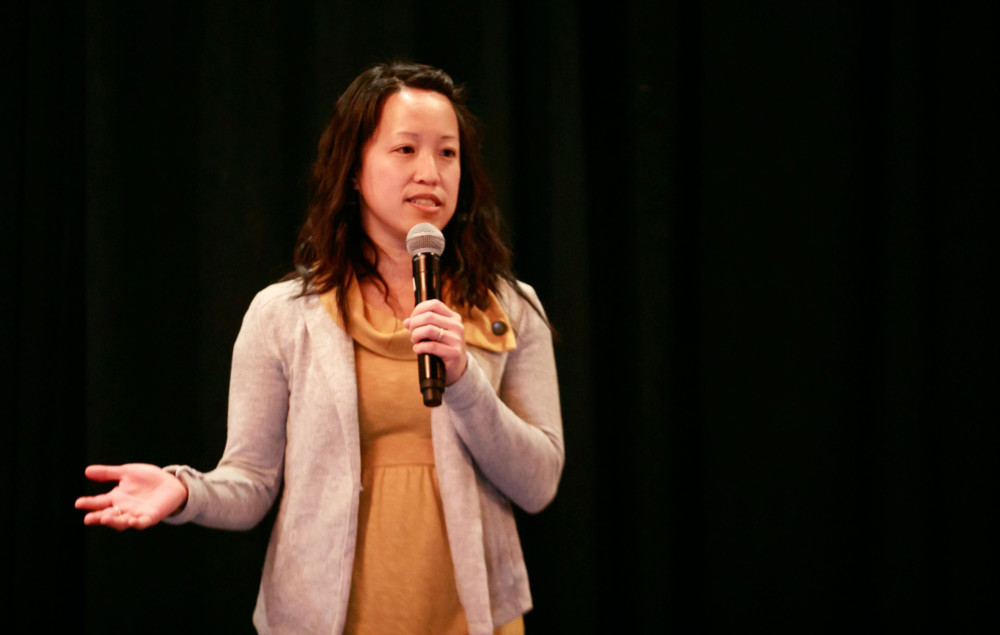By Katherine Long
The Seattle Times
WWR Article Summary (tl;dr) At a Seattle conference focused on education, teachers shared the good, bad and the ugly of some of their teaching experiences over the years and how those experiences shaped them to become the teachers they are today.
The Seattle Times
A 13-year-old who has figured out a recipe for leadership, an award-winning teacher who learned an important lesson after making a mistake, a parent haunted by the taunts she leveled at another student in middle school, those were some of the speakers who took to the stage for an evening of storytelling about education.
Ignite Education Lab’s “Unexpected Adventures in Learning,” sponsored by The Seattle Times Education Lab project and Town Hall Seattle, gave nine very different speakers a chance to talk about a range of education issues.
Mandy Manning had a filmmaking degree, two years of volunteer work in the Peace Corps and no teaching degree when she began working at a small-town Texas high school. One day, she erupted at a student who was disrupting class, calling him an idiot.
Manning quickly realized her mistake. She tried to take it back, but her words had done lasting damage to her relationship with the student, and underscored for her the power of the words she uses as a teacher.
“I took that moment with me for the rest of my career,” she told the audience of about 250 at Seattle University’s Campion Ballroom. Today, Manning is the 2018 Washington State Teacher of the Year, and one of four finalists for National Teacher of the Year.
Melissa Charette described the hardest day in her 20-year career as a special-education teacher: The day a new student, who was autistic and nonverbal, fell apart in her classroom.
“I spent three hours with this student under a table; nothing was working,” Charette said. It took her and her fellow teachers time to figure out what the student needed in order to stay calm and focused. Three years later, her student is integrated with his peers for much of the school day, has learned functional life skills, and has made friends. She urged the audience, many of whom were teachers, not to judge a student by his or her behavior on the first day of school.
Melody Ip, a part-time writer and editor and a “former mean girl,” as she described herself, reflected on the regret she now feels for bullying an autistic student when she was in sixth grade.
Ip said she wishes a teacher had given her a one-on-one lesson on empathy, but she’s heartened that her own son is learning those lessons in school today, thanks to a compassionate teacher who invites two medically fragile children into his classroom.
Seventh grader Katherine Kang described how she has already learned a key lesson in leadership: The importance of showing up and speaking her mind.
“Showing up often leads to active participation,” said the University Prep student, who says she has never missed a single day of school. “Active participation leads to leadership roles.”
Improv comedy was the secret weapon that Aviva Levin took into the classroom when she began teaching French in British Columbia. Levin found that by encouraging her students to use improv while speaking a foreign language, she was able to help them open up about their own lives and experiences.
Carrie Basas was born with a rare orthopedic condition and attended a separate school for children with disabilities until she was in third grade. Doctors and teachers told her to be “more normal,” but later in life, she connected with a community of disabled people who told her “it wasn’t unreasonable for me to expect the world to change.” Now director of Gov. Jay Inslee’s Office of Education Ombuds, she called for more disabled people to become leaders.
Gerrit Kischner tried a bold experiment as a Seattle elementary-school principal: When his school had an unusual gender imbalance, many more boys than girls, he created a boys-only class for one year to focus the school’s limited resources.
Not only did the boys benefit with top test scores, but the other classes did well, too.
Ricardo Perez spoke fondly of an agricultural teacher in the small Texas town where he grow up, a teacher whose passion for plants helped Perez realize his own potential for learning.
Rashad Norris ended the night with poetic descriptions of his mom’s fragrant, delectable cooking. Norris, the director of community engagement at Highline College, encouraged the audience to help students look beyond fast-and-easy answers, answers so simple that, unlike his mother’s cooking, seem like they popped out of a microwave.
The event was emceed by Nathan Gibbs-Bowling, the 2016 Washington State Teacher of the Year, and Teresa Scribner, an award-winning media teacher at Cleveland STEM High School in Seattle.














































































































































































































































































































































































